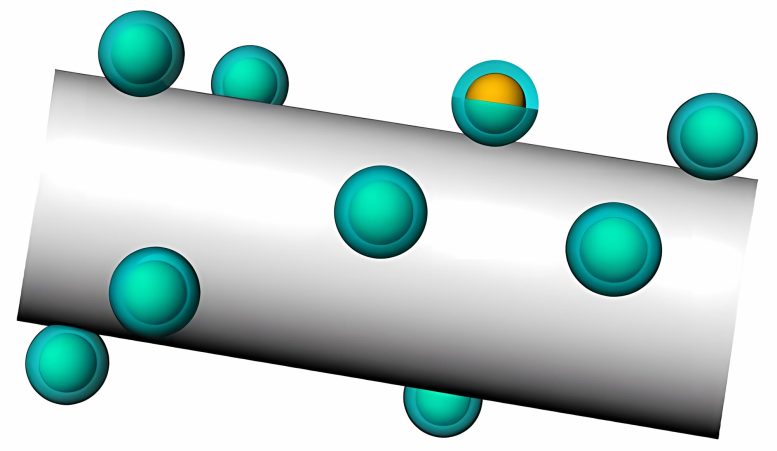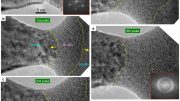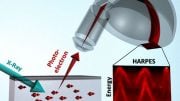
A palladium-silver combination could serve as a lower-cost alternative to platinum in alkaline fuel cells, according to Yale researchers. Credit: Illustration by André Taylor lab/Yale
In a newly published study, engineers synthesize a platinum-free catalyst for use in alkaline fuel cells, showing that silver-palladium multi-walled carbon nanotubes are almost as effective as platinum in low-temperature fuel cells.
Researchers at Yale University have taken another step toward the development of low-temperature, lower-cost alkaline fuel cells, which are battery-like devices that convert oxygen and hydrogen into electricity and heat.
In research recently published in the journal Applied Catalysis B: Environmental, Yale engineers report synthesizing a platinum-free catalyst for use in alkaline fuel cells by substituting less-costly palladium for platinum and combining it with silver.
The catalyst is the part of the fuel cell that breaks down the fuel (alcohol or hydrogen, for example), setting in motion other chemical reactions that ultimately produce electricity and heat. Platinum has been the preferred catalyst material, but its scarcity has prevented the widespread use of fuel cells. The Yale researchers showed that a palladium-silver combination is almost as effective as platinum, making it a viable — and less expensive — alternative.
“The high cost of platinum and other noble metals is one of the major hurdles for the commercialization of low-temperature fuel cells,” said André D. Taylor, assistant professor of chemical and environmental engineering at Yale and principal investigator of the research. “This catalyst architecture could reduce this cost by using palladium only in the shell region of the catalyst.”
The researchers’ technique for making the catalyst’s thin palladium shell, called galvanic displacement, could be used for fabricating new materials with properties appropriate for a wide range of other applications, such as sensors, or battery materials.
The new, platinum-free catalyst has a unique core-shell structure; the thin shell is palladium, and the core is silver. This allows for higher catalytic activity and greater tolerance for impurities than standard platinum-based catalysts. Particles of silver coated with palladium cover the surface of multi-walled carbon nanotubes, promoting the reduction of oxygen over the oxidation of alcohol, and facilitating desirable chemical reactions.
The research results show that silver-palladium multi-walled carbon nanotubes are promising platinum-free cathode catalysts with desirable properties for oxygen reduction, as well as an improved tolerance to methanol and ethanol. Tolerance to alcohol is important due to fuel crossover in the fuel cell, which occurs by the diffusion across the membrane.
Reference: “Silver palladium core–shell electrocatalyst supported on MWNTs for ORR in alkaline media” by Ryan C. Sekol, Xiaokai Li, Peter Cohen, Gustavo Doubek, Marcelo Carmo and André D. Taylor, 6 March 2013, Applied Catalysis B: Environmental.
DOI: 10.1016/j.apcatb.2013.02.054
Ryan C. Sekol is lead author. The paper, published on March 13, contains a complete list of co-authors.
The National Science Foundation and Yale Climate Energy Initiative provided support for the research.









Be the first to comment on "Another Step Toward Lower Cost Alkaline Fuel Cells"